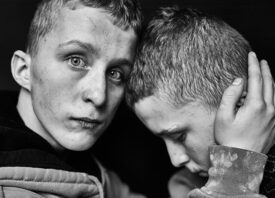Search this site
Youth on Probation Photographed by Zora Murff


With a background in psychology and social work, Iowa-based photographer Zora Murff originally accepted the position as a Linn County Juvenile Detention and Diversions Services “Tracker”—one who monitors youth on probation—for the flexibility it allowed while he pursued his photography. After spending several months on the job, the relationships he formed with the youth in his charge sparked a possibility for further study and he has since begun an extensive documentation of the privacy, control and rehabilitation process in U.S. juvenile corrections facilities. A juxtaposition of deflected portraits and uncomfortable realities, Corrections is a frank and unassuming examination of the everyday processes and lives of adolescents in the system. We recently asked him more about the project.


Regarding notions of privacy while on probation, do you feel the monitoring set in place by the establishment takes its liberties too far?
“The monitoring that Tracking provides—physical monitoring or electronic monitoring—is a response to the delinquent behaviors that the kids commit. From my experiences working in the system I don’t feel that the establishment has taken the monitoring too far, nor do they have any ill intent. This is also in line with the notion of control. I feel that the typical human response is to buck any force that attempts to exert control over us, so as a Tracker the question becomes how to work with the youth to guide them to make more positive choices, so that they do not need a force such as myself in their life. With this project, I raise the question of how my presence and their involvement in the system affects their development. I hope that the work that I do with them helps in some way or another—I experience small successes with them everyday.”

What was the general attitude of the youth you worked with? Remorse? Frustration?
“There are a wide array of emotions involved when kids are referred to Tracking. Some of the kids are angry or frustrated by being required to work with a Tracker, some may be ashamed by what they have done, and some are completely apathetic to the situation. Most of the time it is a combination of all those things.”


What has working on Corrections taught you about the criminal justice system in the U.S.? Are the measures the government takes helpful in assisting these young people to become healthy adults?
“Working on this project has taught me that the criminal justice system is a gray area, and that there are no definite answers. Techniques that work with one kid may be totally off-base with another, so you have to navigate on an individual basis. I try to instill a lot of positivity in the kids that I work with, reminding them that they have their whole lives ahead of them and that they are all capable of success. The experiences that I have had with juvenile court officers and my supervisors at the detention center have also reinforced this—that the youth may be in a place that they don’t want to be right now, but that all of this can be temporary and that they are all capable of making positive changes. That is what we are here to help them do.”




